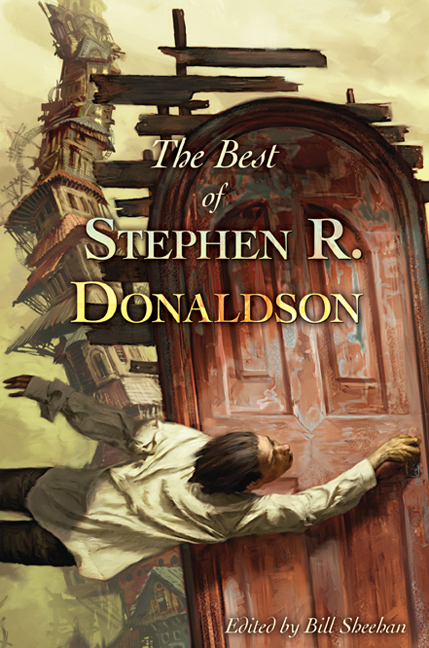Stephen R. Donaldson will probably always be best known for his novels: the epic fantasy series The Chronicles of Thomas Covenant, the wonderful fantasy diptych Mordant’s Need, and—my personal favorite—the dark science fiction Gap Cycle. However, Donaldson has also produced a number of great short stories and novellas throughout his career. So far, these mainly could be found in his two collections, Daughter of Regals and Other Tales (1984) and Reave the Just and Other Tales (1999), but thanks to the nice folks at Subterranean Press, you can now also get a solid sample of the author’s shorter works in The Best of Stephen R. Donaldson, a generous slab of fiction that includes the two title novellas from his previous collections and nine other stories.
Aside from “Daughter of Regals,” which opens the collection, the stories are presented more or less in the order in which they were originally published, making this one of those books that seems to get better with every story. Again skipping the wonderful and famous opening novella, the first two stories are “Mythological Beast” and “Animal Lover,” the only two science fiction stories in the collection. They date back to 1978 and are probably the weakest parts of the collection, mainly because they feel much more dated than the others, with frequent references to computer storage on “tape decks,” and one story set in futuristic 2011, which must have felt sufficiently distant back in 1978. “Mythological Beast” is basically an elaborate science fiction variation on Franz Kafka’s “Metamorphosis,” and “Animal Lover” is an entertaining but light piece of action science fiction. These stories aren’t bad at all, but they don’t have anywhere near the same impact as the rest of the collection.
Fortunately, things improve rapidly from this point on. “Unworthy of the Angel” is a lovely contemporary fantasy about a painter who has made a terrible deal, and the angel trying to save him and his sister. “The Conqueror Worm” is a dark, almost claustrophobic psychological horror story. It’s the shortest story in the collection, and one of the most delicately crafted ones. The final story from the original Daughter of Regals and Other Tales collection is “Ser Visal’s Tale,” and despite the fact that the ending is a bit predictable, it’s one of the finest pieces in the book.
The rest of the stories are all from Reave the Just and Other Tales, starting with its memorable title story, which echoes some of the themes of Donaldson’s Gap Cycle in a fantasy format and which, after all these years, is still one of the best examples of short fantasy fiction I’ve ever read. Next up is “The Woman Who Loved Pigs,” about a mentally challenged girl who gets adopted by a pig. “The Kings of Tharshish Shall Bring Gifts” is a powerful fable about escapism. “Penance” is, for my money, the finest vampire story ever written, and “The Killing Stroke” combines magic, martial arts and philosophy in an entirely unique way.
Several of these stories go back to the same central theme: the need to make ethical choices and to be morally self-sufficient, even when starting out from a position that doesn’t make this easy. The painter in “Unworthy of the Angel” and the hopelessly confused bumpkin in “Reave the Just,” just to name a few, are eventually confronted with situations that show how misguided their previous decisions were. One of the reasons why the character Reave the Just comes as such a shock, when you finally encounter him, is that he seems to live in a universe of moral absolutes. Unlike every other character in these stories, he assesses the rightness of any decision confidently and almost instantaneously. It’s hard not to imagine what his judgments would be, were he able to wander into any of the other stories and straighten out their characters.
Another one of Donaldson’s frequently recurring themes, not just in these stories but throughout his career, seems to be manipulation. Many of his characters are in some way controlled or driven by more powerful people, and the central focus of the stories often rests on what course of action they choose when they become aware of this and/or when they break free. The decisions are never easy, and Donaldson is an expert at making the reader share his characters’ angst, conveying it with great precision in his stately, almost formal prose.
It’s always easy to second-guess story selection in a “Best of” collection, but in this case I feel that editor Bill Sheehan did a great job. I would have loved to see “The Djinn Who Watches over the Accursed” included here, but then again, I honestly don’t know which of the other stories from Reave the Just and Other Tales I would have left out to make space for it. If there’s one thing I really missed in this otherwise excellent collection, it’s some accompanying material: an introduction by the author or the editor, a brief biography, maybe some notes about the stories.
Then again, the stories are what’s most important, and many of the ones in this collection are so good that, if you told me that Donaldson published a novel or series that takes place in the same setting, I’d run out to grab and read it right now. If you’re not familiar yet with the shorter works of this masterful author, The Best of Stephen R. Donaldson is a great way to get caught up.
Stefan Raets reads and reviews science fiction and fantasy whenever he isn’t distracted by less important things like eating and sleeping. Many of his reviews can be found at Fantasy Literature.










